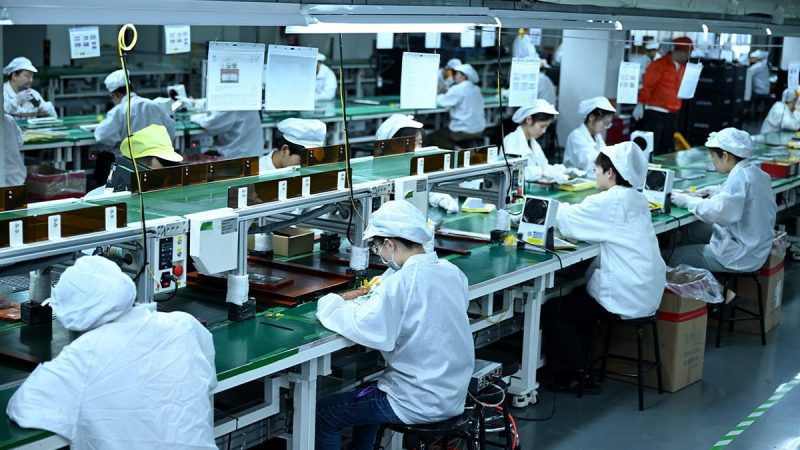In a damning new report, researchers reveal how China came to control over 80% of the critical raw battery materials needed for defense technology — posing an urgent national security threat.
Through lax permitting processes, weak environmental standards, and aggressive state-led interventions, China has come to dominate global supplies of graphite, cobalt, manganese, and the battery anode and cathode materials that power advanced defense systems.
‘Batteries will be one of the bullets of future wars,’ the report’s authors warn, citing their essential role in drones, handheld radios, autonomous submersibles, and emerging capabilities like lasers and directed energy weapons.
According to the Foundation for Defense of Democracies (FDD), the Chinese Communist Party (CCP) has weaponized global battery infrastructure through a combination of state subsidies, forced intellectual property transfers, and predatory pricing practices.
China didn’t just rely on low-cost tactics — it also used its financial muscle abroad. Over the past two decades, at least 26 state-backed banks have pumped roughly $57 billion into mining and processing projects in Africa, Latin America, and beyond. These investments, often structured through joint ventures and special-purpose vehicles, gave Chinese firms controlling stakes in mineral mining, the report said.
Through its Belt and Road Initiative, China has leveraged influence in resource-rich developing nations, securing control over massive critical mineral deposits. Today, it processes approximately 65% of the world’s lithium, 85% of graphite, 70% of cathodes, 85% of anodes, and a staggering 97% of anode active materials.
Beyond powering drones, handheld radios, and electric vehicles, lithium is critical in strategic military systems: lithium-ion batteries are used in grid support for bases and emerging directed-energy weapons.
Moreover, Beijing has begun weaponizing export controls: since 2023, it has tightened restrictions on processed graphite, gallium, and germanium — later adding antimony, tungsten, and rare earths to the roster. These measures curb exports via a licensing regime and broad bans on exports to the U.S., signaling a clear geopolitical leverage too, according to the report.
Both lithium and graphite are essential for modern nuclear weapons. Cobalt alloys are used in jet engines, naval turbines, electronics connectors, and sensors capable of withstanding extreme temperatures, vibration, and radiation-making.
While American and allied reserves of lithium — both brine and hard rock — are being tapped, with new projects in North and South Carolina targeting domestic spodumene processing, the report claims U.S. mineral mining and refining are not advancing quickly enough to meet national security demands.
Permitting obstacles account for roughly 40% of all delays in mining projects, the report notes, with processing operations facing similarly cumbersome constraints.
Chinese subsidies ‘dwarf’ those available to U.S. firms, and include tax exemptions, direct manufacturing grants, and ultra-low-interest loans, the report said.
U.S. firms are now accelerating investment in domestic alternatives to China’s lithium. With new Trump administration initiatives aimed at incentivizing critical mineral development—and forecasts projecting the U.S. lithium market to grow by roughly 500% over the next five years — American companies are beginning to build out processing capacity on home soil.
Piedmont Lithium is developing a lithium hydroxide facility in North Carolina to process spodumene concentrate from its U.S. deposits, while Albemarle recently announced plans for a new lithium processing plant in Chester County, South Carolina. Both projects are designed to feed a fast-growing domestic battery ecosystem and reduce dependence on Chinese supply chains.
But to become globally competitive, the report argues, the U.S. must take a far more proactive approach, including incentivizing private-sector investment, streamlining federal permitting, establishing a national critical minerals stockpile, building technical talent pipelines, creating special economic zones, and developing robust domestic processing infrastructure.
The authors also stress the importance of ally-shoring, recommending diplomatic coordination with trusted partners — similar to prior U.S. efforts involving Ukraine, Greenland, and the DRC in rare-earth sourcing — to construct resilient supply chains beyond China’s reach.
‘Despite China’s control of the battery supply chain, this is a time of great vulnerability for Beijing, while the United States and its core allies remain strong,’ the report concludes.
‘It is time for new guardrails, muscular statecraft, and a unified international response to non-market manipulation. Building critical supply chains that are independent of China’s coercive economic practices can help unleash a wave of cooperation among free-market nations that will lift up both established allies and emerging market partners and turn the tide against China’s parasitic economic model.’






















